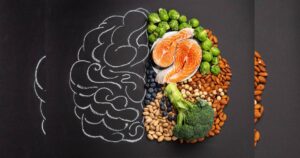Did you know that the food you eat can have a profound impact on your mental health? It’s true—nutrition plays a crucial role in supporting brain function, cognitive health, and mood regulation. By incorporating the right foods into your diet, you can enhance your mental well-being and reduce the risk of mental disorders like depression and anxiety. In this comprehensive guide, we will explore the connection between nutrition and mental health and highlight five nutritious foods that can help boost your well-being.
The Importance of Diet for Mental Health
A growing body of research suggests that maintaining a healthy diet is not only beneficial for your physical health but also for your mental well-being. Healthy diets, particularly those rich in whole foods, provide essential nutrients that support various aspects of mental health, including cognitive function, concentration, memory, and mood regulation. On the other hand, diets high in added sugars, processed foods, and junk food have been associated with an increased risk of depression. It’s therefore crucial to adopt healthier eating habits to promote optimal mental health.
The Role of Nutrition in Brain Health
Eating a balanced diet that includes a variety of minimally processed whole foods provides your brain with essential nutrients. Omega-3 fatty acids, B vitamins, and iron are key nutrients that support brain health and function. Additionally, a diet rich in fiber can help improve gut health, which is closely linked to mental health. In contrast, diets high in fat and sugar can have detrimental effects on brain health, negatively impacting important brain proteins and promoting inflammation. It’s clear that the foods we consume can significantly influence our mental well-being.
Signs of Nutrient Deficiency and Poor Mental Health
It’s important to be aware of the signs that your diet may be lacking important nutrients for brain health. Some common signs of nutrient deficiency and poor mental health include fatigue, low energy levels, mood fluctuations, poor concentration, anxiety, and depression. If you experience any of these symptoms, it may be an indication that you need to incorporate more brain health-boosting foods into your diet.
Five Nutritious Foods for Mental Health
Here are five foods that are rich in nutrients and have been shown to support mental health:
1. Salmon: A Brain-Boosting Omega-3 Powerhouse
Salmon is a top-ranked food for mental health due to its high content of omega-3 fatty acids. Omega-3s have been found to reduce the risk of depression and dementia while improving mood. These essential fatty acids possess anti-inflammatory and antioxidant properties that promote healthier brain cells and protect against brain deterioration. Aim to consume two servings of salmon per week to meet your recommended intake of omega-3 fatty acids. Try incorporating smoked salmon into salads or enjoy grilled Atlantic salmon with dill, risotto, and asparagus.
2. Eggs: A Nutritional Powerhouse for Brain Function
Eggs are a nutritional powerhouse when it comes to supporting brain health. They are rich in B vitamins, including B1, B2, B3, B6, and B12, which play a vital role in regulating normal brain function. Additionally, eggs contain choline and lutein, essential nutrients for brain development, memory, and learning. Choline, in particular, cannot be produced in sufficient amounts by the body, so including eggs in your diet is an excellent way to ensure adequate intake. Be sure to consume the whole egg to reap all the brain-boosting benefits. If you have high cholesterol, heart disease, or type 2 diabetes, the Heart Foundation recommends limiting your egg consumption to no more than seven per week.
3. Nuts: Nature’s Mood-Boosting Wonder
Nuts are not only a convenient and delicious snack but also a fantastic source of mood-boosting nutrients. They are rich in antioxidants, which contribute to the prevention of dementia, and their polyunsaturated fats play a crucial role in the formation of new brain cells. Research has shown that nuts are associated with improvements in cognitive function, learning, memory, and mood. Just a handful of nuts each day is enough to reap these benefits. Incorporate a variety of nuts into your diet, such as almonds, walnuts, cashews, and pistachios, for a diverse range of nutrients.
4. Avocados: A Creamy Superfood for Brain Health
Avocados are not only delicious but also packed with nutrients that support brain health. They contain monounsaturated fats, niacin, folate, vitamin B5, vitamin C, and vitamin E, all of which are beneficial for the brain. B vitamins are essential for maintaining healthy cell structure and neurotransmitter production, while vitamin E acts as an antioxidant, protecting nerve cells. Monounsaturated fats promote healthy blood flow, which is crucial for maintaining a healthy brain. Add a quarter of an avocado to your scrambled eggs, favorite salad, or smoothie to enjoy the brain-loving benefits of this creamy superfood.
5. Blueberries: Nature’s Brain-Boosting Berries
Blueberries are not only delicious but also packed with nutrients that support brain health. They have one of the highest antioxidant concentrations of any fruit, which helps reduce oxidative stress and inflammation, protecting brain cells from damage. Blueberries also have the ability to change the way neurons in the brain communicate, promoting overall brain health. Enjoy blueberries in your morning muesli, smoothies, salads, muffins, or simply as a healthy snack. Aim to incorporate at least two servings of fruit, including blueberries, into your daily diet.
Conclusion: Nourish Your Brain for Optimal Mental Health
Incorporating the right foods into your diet can have a significant impact on your mental health and well-being. By choosing a balanced diet rich in whole foods, such as salmon, eggs, nuts, avocados, and blueberries, you can provide your brain with the essential nutrients it needs to function optimally. Remember to prioritize your mental health by making informed dietary choices and adopting healthier eating habits. Your brain will thank you for it!
Disclaimer: The information provided in this article is for educational purposes only and should not replace medical advice. If you have specific dietary needs or concerns, consult with a healthcare professional or registered dietitian.







